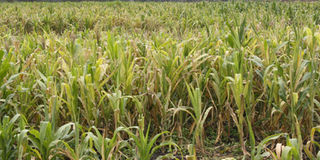Failed harvest pushes price of maize bag to Sh6,500 in Naivasha

A maize farm at Marula in Naivasha
Poor rains coupled with a failed harvest are threatening food security in Naivasha sub-county, with the prices of maize and beans going through the roof.
Moi Ndabi-based farmer Mohamed Wako painted a grim picture of the situation, saying a 90kg bag of maize was going for Sh6,500, the highest price in decades.
The small-scale farmer had planted five acres of maize and beans and said this is the first they have seen such prices.
“Failed long rains have greatly affected food basket areas in Naivasha sub-county, with Maiella, Moi Ndabi and Ndabibi hit hard,” he explained.
Mr Wako, a member of a school board, said they had cultivated seven acres belonging to the school but the crops withered in the fields.
“As we are speaking, I am looking for someone to purchase the drying maize stalks,” he added.
Silvanus Kamamia, another farmer, said he had cultivated 12 acres of maize and beans, but the crops dried up in the fields.
Unlike in the past, he said, the area has experienced inadequate rainfall.
The Ndabibi-based farmer said some of his colleagues had to sell green maize for Sh7,000 per truck, terming the panic sale as “unprofitable”.
“It is a last-ditch effort to salvage the current situation. But given that it takes almost Sh30,000 to cultivate one acre of maize and beans, one can quantify how much those affected are losing,” Mr Kamamia said.
For his part, Peter Nyamumbo faulted the two levels of government, saying they had failed to complete building water pans in the Moi Ndabi area.
The retired civil servant attributed the current phenomenon to “overreliance” on rain-fed agriculture.
The project, which commenced in 2020, saw more than 250 farmers from Maiella incorporated into a scheme meant to address perennial water shortages in the area.
“We were upbeat about the project … The area is relatively dry and the constructed pans were meant to boost agricultural activities,” Mr Nyamumbo told the Nation.
But he now feels that the project is a “white elephant”, with the government failing to provide them with dam liners to complete the much awaited water reservoirs.
“I recently managed to fit my pan with a liner but the price is prohibitive, an average cost of Sh450,000, way beyond the purchasing power of many farmers,” he said.
He regretted that although the project was noble, delays in completing the pans had discouraged most farmers who gave out parts of their land for the building of the reservoir.
Mr Nyamumbo said crops were now going to waste in the fields due to a prolonged dry spell, with farmers selling green maize at “throwaway prices”.




